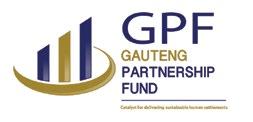
7 minute read
ADVERTORIAL: Gauteng Partnership Fund - catalyst in the delivery of integrated human settlements in Gauteng
Gauteng Partnership Fund -
Traditionally associated with the funding and implementation of social housing projects, rental housing and off-campus student accommodation opportunities, the Gauteng Partnership Fund (GPF) has strategically repositioned itself to include its existing role, and implementation agency role for mega projects.
Daniel Molokomme, Acting CEO, of Gauteng Partnership Fund
The Gauteng Partnership Fund (GPF) is a schedule 3C Public Entity founded in 2002 and is 100% owned by the Gauteng Department of Human Settlements within the province.
SA BUSINESS INTEGRATOR interviewed Acting CEO of the GPF, Daniel Molokomme, the Investment Officer for the organisation, Shiraaz Lorgat, and Marketing and Communications Manager, Ntombenhle Gwina, about these changes and the standout progress that the Fund has made in recent times.
“With the GPF’s experience in leveraging funding, we became the implementation agent for the Gauteng Department of Human Settlements for mega projects. We traditionally provided mezzanine funding for perpetual rental programmes. To illustrate the funding agency model simply, we work on a 10% equity basis, 30% from GPF and 60% from a senior funder," explains Lorgat.
Senior funders include organisations such as the Public Investment Corporation (PIC), the Trust for Urban Housing Finance, the National Empowerment Fund and the Futuregrowth Asset Management.
Molokomme adds: “The GPF sees itself more lately as taking on the role of catalyst in the delivery of integrated human settlements in Gauteng. This means bringing developers onboard and project-managing the construction part. The Department of Human Settlements (Gauteng) makes a budget available for us to develop mega-projects”.
Empowerment of emerging members of the property development value chain
An additional and consequential key benefit of the GPF’s operations is the empowerment of emerging developers, contractors and other members of the property development value chain in Gauteng, including the provision of employment
inside the affected communities.
“Mega projects aim to stimulate the local economy in the area of the development and to make sure that the residents within the project have access to social amenities such as schools, other relevant social amenities and also access to transport," says Molokomme.
“In terms of zoning, these mega projects include multi land use, for example, land for economic development, sites for schools, and land for development of commercial use or light industry. This includes multi-typology housing consisting of a mix of fully subsidised housing for lower income groups, and others that will have finance-linked individual subsidy programme (FLISP), and also bonded stock. The reason we develop the project this way is to make the project viable and the community viable so that there is a symbiotic relationship between different types of income groups. For example, some residents will then have access to domestic work opportunities (for homes within the complex); while others may find jobs within the construction part of the project.
“Our mandate comes from the Department of Human Settlements strategy for mega projects. The GPF is seen as quick and agile in project implementation compared with the government and is able to use expertise from within the market to manage the construction. Final approval, however, regarding approval of the standard and quality of the housing stock delivered prior to the developer being paid, rests with the Department," adds Molokomme.
“In addition, there is input from the local authority/ municipality which has to approve development plans, issue rezoning approvals, provide bulk infrastructure, and finally issue certificates of occupancy for the housing stock. The enablers, as bulk infrastructure, are funded by government direct to the metro or the municipality in various forms”.
The Elijah Barayi mega project - West Rand
The Elijah Barayi mega project was one of the projects assigned to the GPF. The proposed Khutsong Elijah Barayi/Varkenslaagte mega project falls within the Merafong Local Municipality’s Spatial Development Framework.
Due to the comprehensive and integrated nature of this development, the project has been hailed as a success.
Named after well-known anti-apartheid activist and Cosatu founding member, Elijah (Oom Bari) Barayi, the GPF is project and financing agent for this burgeoning project, at present under development by Gauteng-based CALP Investment (Pty) Ltd.
The development is planned to deliver approximately 12 491 housing units, social amenities and schools as well as commercial developments when completed.
With informal settlements at various areas within the Merafong City Local Municipality, and the current housing shortage, Elijah Barayi will contribute to the gradual eradication of the informal settlements. To date, the project has delivered 2 318 units at 95% completion and 587 at 100%, with more houses currently in different stages of construction. The project has made significant economic impact within the community by creating jobs and supporting local suppliers as well as local SMMEs.
For example, says Molokomme, the Elijah project has created local labour opportunities in terms of the building materials used on site.
The GPF says it will continue to work closely with CALP Investment (Pty) Ltd to facilitate funding for the development of other components of the mega projects, including the commercial, social housing and bonded houses.
Molokomme says that the term social housing includes persons earning up to R15 000 per month, since rental stock available in the (commercial) market is beyond their

The Elijah Barayi mega project - West Rand
income affordability.
“Entry level for this stock is R1 500 per month, up to R15 000 per month. That mandate, however, is not given to GPF, it is given to the Social Housing Regulatory Authority (SHRA)," he says. The SHRA is an agency of the national government.
Developing the developer
The GPF has a programme called the Empowerment of Entrepreneurs to enable qualifying property developers to participate in the affordable rental development space.
“The Entrepreneur Empowerment Property Fund (EEPF) enables 100% black-owned developers to participate in the programme,” says Lorgat.
“The idea was to bring in first-time property developers who want to start a portfolio of rental-stock property developments in line with (national) government’s transformation programme within the sector.
“Equity is a problem for black entrepreneurs, so we made the programme accessible by not structuring the equity requirements too high. The Public Investment Corporation (PIC) has entered the programme as senior funder with the objective of providing affordable interest rates to the more high risk case developers. In fact, we turned the risk model around. The more risky the applicant, we put mitigating factors in place and then offer market-related interest rates. This is the enabling factor to bring black entrepreneurs into the rental market. We even provided interest-free funding so that it would aid the feasibility of the project," adds Lorgat.
Benefitting the developer at all levels
In addition, the agility of the organisation is highly beneficial to the developer in terms of the speed in which payments on the project can be made. Lorgat comments that while the Department pays in excess of 15-30 days, the GPF normally pays within seven days.
“Cash flow is critical for developers and this also eases the strain on cash flow for the developer on mega projects,” he says.
BNG (breaking new ground) projects are the easiest way for a developer to gain entry into the process. Very little capital is needed from the developer and payment is quickly facilitated by the GPF for the various stages. This also serves to stipulate the life of the emerging new 'city'.
Molokomme reinforces the role that the interest-free funding is playing in the process as key.
“This is what makes our approach different to the commercial banks and other funding entities," he says. "We are different to the other mezzanine finance providers who charge prime plus interest. We charge prime minus interest,” adds Lorgat.
“For a senior funder, this is attractive because we are mitigating the risk with effective funding of 45% of the project. This makes it easy for the senior funder and signals our uniqueness. We very seldom get refusals for senior funding applications for our qualifying applicants into rental housing projects. This is how the GPF is different.
“We partner with the PIC, the Trust for Urban Housing Finance organisation, the National Empowerment Fund and Futuregrowth, especially with regards to the rental housing projects and also student accommodation in the case of the latter. In fact, GPF relies heavily on strategic relations with other institutions so we can leverage funding. That’s our role," adds Gwina.
Molokomme says that when the GPF was initially established, it had a one-off capital injection from the Department of Human Settlements (Gauteng). "We then played an implementation role in the mega projects for the Department, for which we charge a management fee for the services provided. This is normal for any environment where you facilitate and projectmanage development," he adds.
In terms of vision, the organisation sees the way forward in the creation of 'new cities' in the making. Over the years, the project will become a substantial development and achieve city status.
www.gpf.org.za











